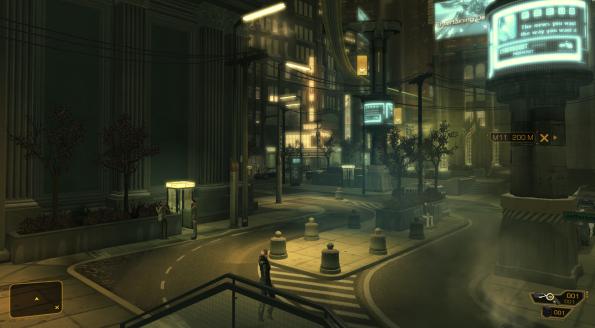Deus Ex: Human Revolution: A Sequel We Always Wanted
Introduction
Eleven years ago, now-defunct developer Ion Storm released Deus Ex and made video game history. The original title cast players in the role of JC Denton, a nanotech-augmented agent with the United Nations Anti-Terrorist Coalition (UNATCO) circa 2052. The game's plot is a fusion of classic conspiracy theories and a referendum on what it means to be human. The problems of humanity in 2052—plague, environmental destruction, rampant terrorism—were far enough away in time to be comfortable, but close enough to be unsettling.

Welcome to Detroit, circa 2027. All screenshots taken from in-game unless otherwise noted
Deus Ex: Human Evolution takes place 25 years before the first game. Mechanical augmentation—a technology that's on its last legs in the original DX—is the only form of augmentation available. The technology is highly controversial; society is polarized over what role augments should be allowed to play and who should control access to and usage of the technology in question. This time, the game is played from the perspective of Adam Jensen, security chief of Sarif Industries, the company that developed and commercialized widescale mechanical augmentation. The setting is appropriately urban, dystopian, and gritty, but does it play like Deus Ex?
Yes. More specifically, it plays like a game designed around the same core principles without falling into the trap of slavish imitation. Since some of you probably aren't familiar with the original, we'll take a moment and discuss them.
Pillars of Design:
Part of what won Deus Ex such acclaim eleven years ago was its open-ended approach to problem solving; virtually every mission could be approached from stealth or with reckless abandon. Enemies could be talked down, avoided, or dealt with using non-lethal measures; the "must-die" tally is between 1-3 people depending on how the count is reckoned.
The game designers also took pains to make failure feel real. At one point, JC's brother Paul lives or dies depending on the actions of the player. Instead of treating the situation as a critical mission objective, the developers allow him to die. It's possible to finish the game without realizing that the situation could've played out differently. Paul's survival/death didn't directly influence which of the three ways the game ultimately ended, but the decision point made DX feel like a game where the player's actions changed the world around him.
With Human Revolution, Eidos-Montreal designed the game around three primary approaches: combat, stealth, and social, meaning conversation/interaction. Hacking, while not a core gameplay mechanism, is designed to facilitate either approach.

Welcome to Detroit, circa 2027. All screenshots taken from in-game unless otherwise noted
Deus Ex: Human Evolution takes place 25 years before the first game. Mechanical augmentation—a technology that's on its last legs in the original DX—is the only form of augmentation available. The technology is highly controversial; society is polarized over what role augments should be allowed to play and who should control access to and usage of the technology in question. This time, the game is played from the perspective of Adam Jensen, security chief of Sarif Industries, the company that developed and commercialized widescale mechanical augmentation. The setting is appropriately urban, dystopian, and gritty, but does it play like Deus Ex?
Yes. More specifically, it plays like a game designed around the same core principles without falling into the trap of slavish imitation. Since some of you probably aren't familiar with the original, we'll take a moment and discuss them.
Pillars of Design:
Part of what won Deus Ex such acclaim eleven years ago was its open-ended approach to problem solving; virtually every mission could be approached from stealth or with reckless abandon. Enemies could be talked down, avoided, or dealt with using non-lethal measures; the "must-die" tally is between 1-3 people depending on how the count is reckoned.
The game designers also took pains to make failure feel real. At one point, JC's brother Paul lives or dies depending on the actions of the player. Instead of treating the situation as a critical mission objective, the developers allow him to die. It's possible to finish the game without realizing that the situation could've played out differently. Paul's survival/death didn't directly influence which of the three ways the game ultimately ended, but the decision point made DX feel like a game where the player's actions changed the world around him.






